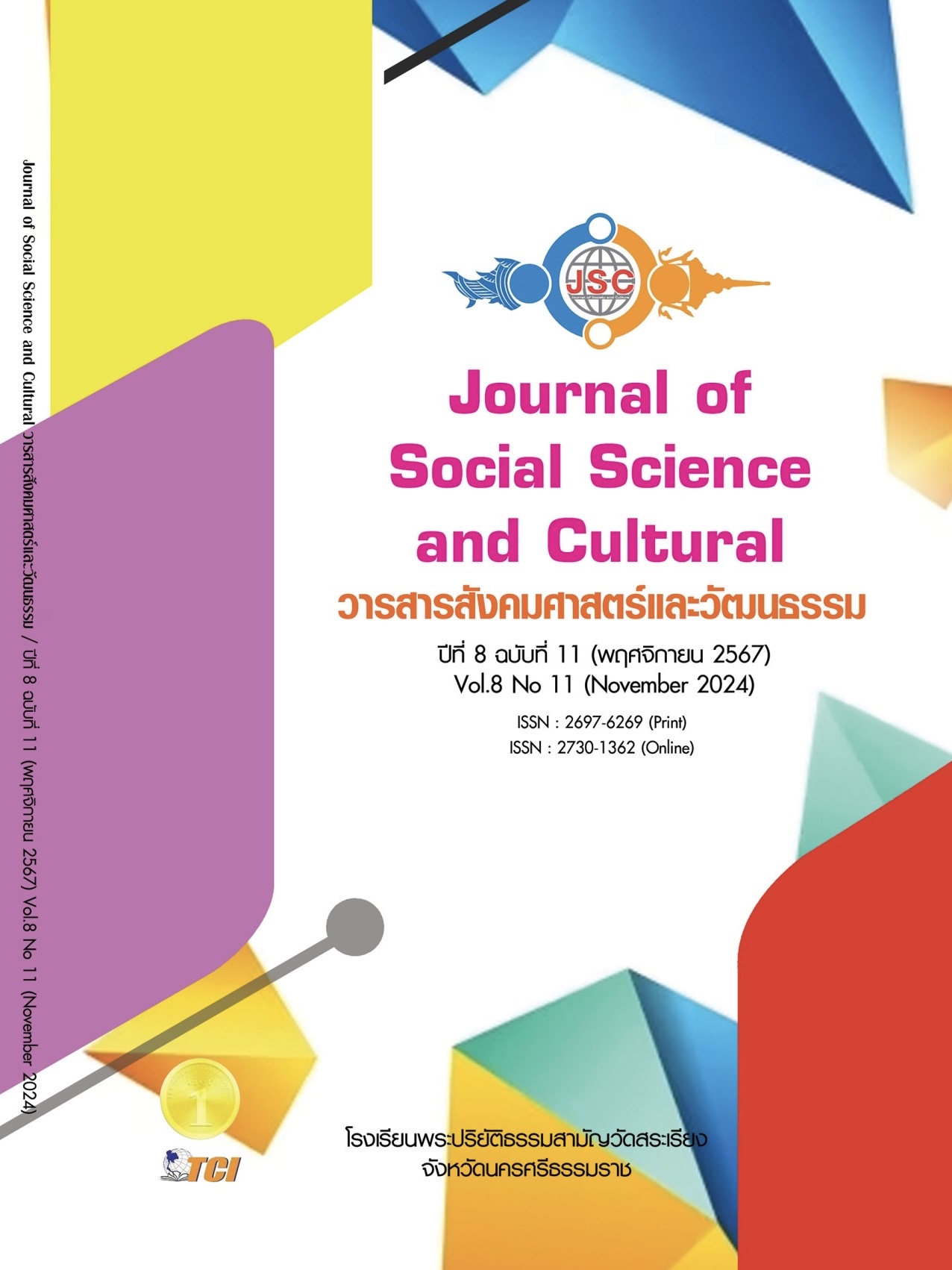MODEL FOR THE DEVELOPMENT OF MORAL INTELLIGENT AMONG YOUNG PEOPLE SOCIAL PROBLEMS IN NAKHON SI THAMMARAT PROVINCE
Main Article Content
Abstract
This research aims to 1) Analyze general problems, 2) Analyze concepts, theories, and
3) Create a knowledge model on the development of moral intelligence in youth to reduce social problems in Nakhon Si Thammarat Province. It is a qualitative research, in-depth interviews with 17 key informants. The research instrument is an interview form and descriptive data analysis. The research results found that 1) The general problems of youth found that currently, children and youth are involved in quarrels, drugs, and adultery. They should be urgently solved in order to gain knowledge and understanding to develop themselves to prevent these problems and to be able to use the principles of moral intelligence to help in life. 2) The concept and theory on the development of moral intelligence found that a person must have 3 basic mental characteristics in an amount appropriate for their age in order to be ready to develop 5 mental characteristics in an appropriate environment. In addition, a person is ready to receive the development of some of these 5 mental characteristics. The 5 basic mental characteristics are the cause of good and capable behavior. 3) The knowledge model on the development of moral intelligence in youth is called the KCTA Model as follows: K = Knowledge, meaning providing knowledge Ethical intelligence C = Concept means creating summary ideas. T = Traning means training. A = Assessment means evaluating progress in ethical intelligence. The provision of knowledge must be to the point, to the target through activities that can actually be done, using intelligence in analyzing and instilling good thoughts. There must be training in the principles of Dharma to be used to learn to solve problems from real events so that the real problems will be known.
Article Details
References
กรมพินิจและคุ้มครองเด็กและเยาวชน. (2565). รายงานสถิติคดีประจำปี 2564. กรุงเทพมหานคร: ศูนย์เทคโนโลยีสารสนเทศ.
ชุติมา แสงดารารัตน์. (2560). การวิเคราะห์องค์ประกอบของความฉลาดทางจริยธรรมของผู้เรียนระดับปริญญาตรี สถาบันอุดมศึกษาเอกชนภาคกลาง. สุทธิปริทัศน์, 31(98), 60-72.
ดวงเดือน พันธุมนาวิน. (2543). ทฤษฎีต้นไม้จริยธรรม: การวิจัยและการพัฒนาบุคคล. (พิมพ์ครั้งที่ 1). กรุงเทพมหานคร: โครงการส่งเสริมเอกสารวิชาการ สถาบันบัณฑิตพัฒนบริหารศาสตร์.
พระมหาอนันต์ องฺกุรสิริ. (2561). คุณธรรมจริยธรรมกับการพัฒนาผู้เรียนในยุคไทยแลนด์ 4.0. วารสารนวัตกรรมการศึกษาและวิจัย, 2(2), 81-90.
ไพฑูรย์ สินลารัตน์. (2544). ความรู้คู่คุณธรรม: รวมบทความเกี่ยวกับคุณธรรม จริยธรรม และการศึกษา. กรุงเทพมหานคร: สำนักพิมพ์แห่งจุฬาลงกรณ์มหาวิทยาลัย.
วิสิฏฐ์ คิดคำส่วน. (2562). แนวคิดเชิงคุณธรรม จริยธรรมจากบุคคลสำคัญ เพื่อเป็นแนวทางปฏิบัติตนของนักศึกษาวิชาคุณธรรม จริยธรรมกับการพัฒนาคุณภาพชีวิต. วารสารบัณฑิตศึกษา, 16(72), 119-130.
สำนักงานสถิติแห่งชาติ. (2564). การสำรวจพฤติกรรมด้านสุขภาพของประชากร พ.ศ. 2564. กรุงเทพมหานคร: สำนักงานสถิติแห่งชาติ.
อริยะ สุพรรณเภษัช. (2545). พัฒนา I. Q. E. Q. M. Q. และสมาธิด้วยพลังคลื่นเสียง. กรุงเทพมหานคร: โรงพิมพ์มหาจุฬาลงกรณ์ราชวิทยาลัย.
อุษณีย์ อีดยี. (2563). ปัญหา และความต้องการในการเสริมสร้างความฉลาดทางจริยธรรม ความฉลาดทางความคิดสร้างสรรค์ และความสามารถในการเผชิญและฟันฝ่าอุปสรรคของนักเรียน โรงเรียนบำรุงวิทยา อำเภอหัวไทร จังหวัดนครศรีธรรมราช. ใน การประชุมหาดใหญ่วิชาการระดับชาติและนานาชาติครั้งที่ 11 - 17 กรกฎาคม 2563 (หน้า 578 -589). สงขลา: มหาวิทยาลัยหาดใหญ่.
Bandura, A. (1972). “Modeling theory: Some traditions, trends, and disputes”. In Parke, R. D. (ed.). Recent trends in Social Learning Theory. New York: Academic Press.
Kohlberg, L. (1976). Moral Stages and Moralization: The Cognitive Developmental ApproachIn Lickona (ed) and Moral Development and Behavior: Theory Research and Social Issues. New York: Holt Rinehart & Winston.
Krathwohl, D. R. (1964). Taxonomy of educational objectives Handbook II The affective domain. New York: McKay.


